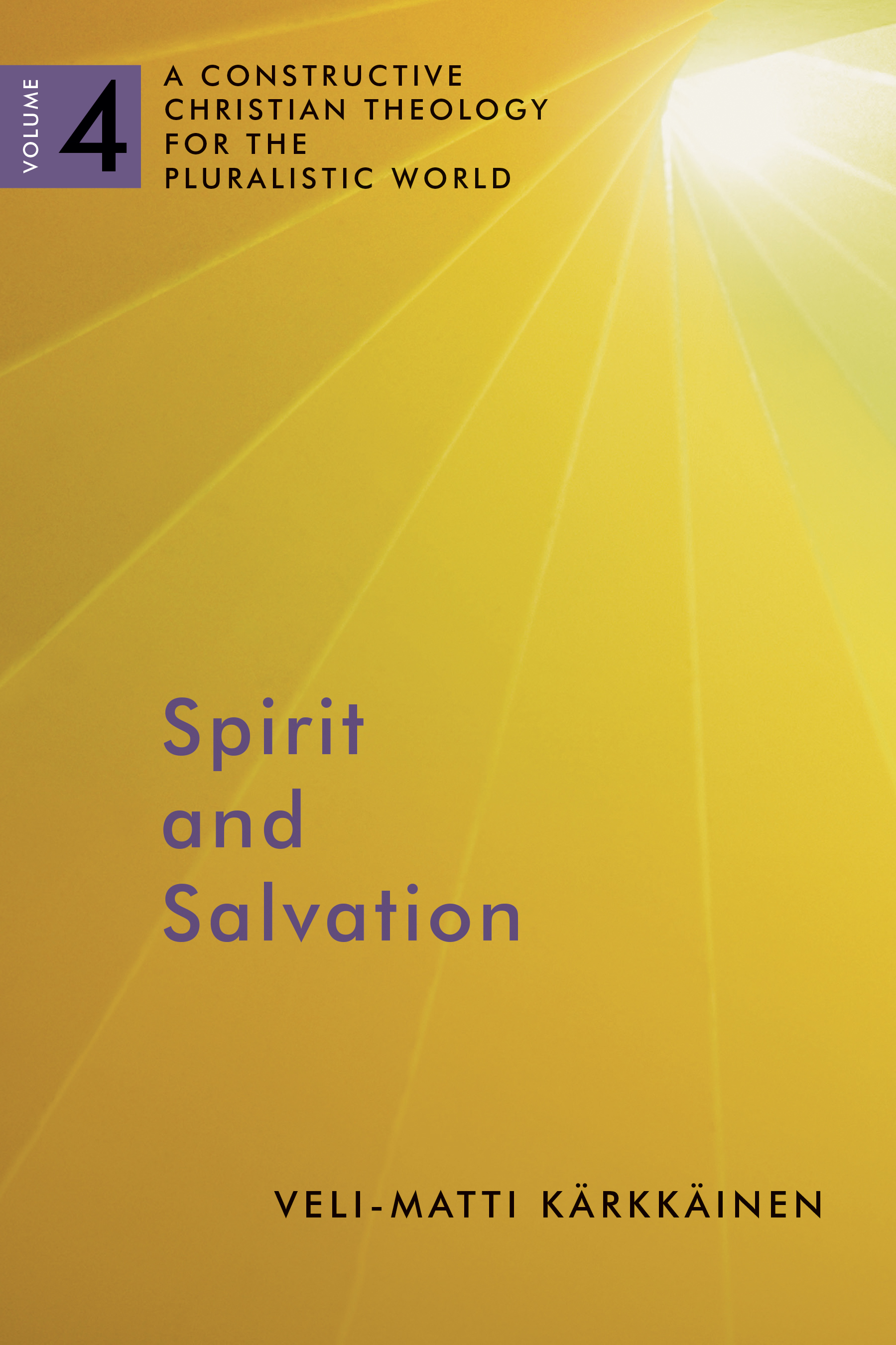Veli-Matti Karkkainen: Spirit and Salvation
 Veli-Matti Kärkkäinen, Spirit and Salvation: A Constructive Christian Theology for the Pluralistic World, Vol. 4 (Grand Rapids, MI: William B. Eerdmans, 2016), xi-498 pages, ISBN 9780802868565.
Veli-Matti Kärkkäinen, Spirit and Salvation: A Constructive Christian Theology for the Pluralistic World, Vol. 4 (Grand Rapids, MI: William B. Eerdmans, 2016), xi-498 pages, ISBN 9780802868565.
As a constructive theologian, Kärkkäinen works to create a coherent explanation of religious belief (in this case Christian) by honest engagement with a variety of voices, including Christian (i.e. Catholic, Eastern Orthodox, third-world, feminist and mainline.), non-Christian (Jewish, Muslim, Hindu, and Buddhist), and scientific. In this sense, Kärkkäinen’s work is negatively described as non-foundational and non-dogmatic and positively as inclusive and dialogical flowing from an attitude of hospitality. This text is Kärkkäinen’s fourth of five installments in the development of that coherent theology.
As in the previous volume, Kärkkäinen divides this work into two main but interrelated topics, the Spirit (third person of the trinity) and Salvation. Readers are cautioned that while this project gives the appearance of a systematic theology, it is not a typical one. Kärkkäinen’s approach engages questions that have been neglected by traditional theologies as well as discusses questions typically never asked. In light of this non-traditional approach, readers must read Kärkkäinen’s ideas carefully lest they make premature judgments about what is being proffered.
While this project gives the appearance of a systematic theology, it is not a typical one.
Chapter 2 is where Kärkkäinen discusses the theology of the Spirit in earnest. He properly reviews some key theological points concerning the Spirit and then delves into the challenge of the filioque. Following a brief historical-theological discussion of the debate surrounding the topic, he ultimately concludes that the clause can be removed or amended in a manner that satisfies the eastern church without undermining the Spirit’s place in the Godhead.
Kärkkäinen’s stated goal is to develop a holistic theology of the Holy Spirit.
Kärkkäinen is quite right to rebuke many western theologians for neglecting the invisible reality of demonic forces.
In part 2, Salvation, the author reviews different steps of the Ordo Salutis. He is somewhat critical of the way the topic has been historically discussed, noting that the early church did not investigate the steps of salvation and that the church (Reformational?) had not paid sufficient attention to the role the Spirit played in salvation.
As with other doctrines, Kärkkäinen surveys how other major religions conceive of salvation, noting areas of agreement and divergence. What is useful about these explorations of other faiths is that readers can discover different illustrations and descriptions to articulate Christian doctrine. In this regard, this theological series can jump start a theologian’s entry into understanding non-Christian religions.
As a relatively newcomer to Calvinism, I had difficulty reading Kärkkäinen’s treatment of the doctrines of grace as taught by Reformed theologians. My challenge lay not with the author’s rejection of TULIP, but the nagging suspicion that his characterization of the system was not fully accurate. I will leave the ultimate verdict to those more grounded in Calvinism than myself. But I will say that very little attention was paid to the exegetical foundation of Calvinism’s view of salvation. This was disappointing. For even though Kärkkäinen is correct that Calvinistic understanding of salvation is somewhat absent in the church fathers, that fact does not by itself answer the question of whether Calvinism’s view of salvation is correct.
Kärkkäinen is to be commended for discussing the healing work of God and the thorny question of baptism of the Holy Spirit.
Chapter 12 covers the often-neglected topic of healing, restoration and empowerment. Kärkkäinen is to be commended for discussing the healing work of God and the thorny question of baptism of the Holy Spirit. While rejecting cessationism, he does not accept the Pentecostal notion that the baptism of the Holy Spirit is always subsequent to conversion. He strangely accepts the sacramentalist notion that Spirit baptism can, but not exclusively, occur at the event of water baptism. Here, as in his treatment of salvation, a greater focus on key scriptures would have been helpful.
Readers interested in ecumenical and constructive theology will find much in this book and Kärkkäinen’s previous volumes to stimulate and challenge ideas.
At times, however, the theological discussion seemed quite disconnected from a biblical foundation. I often had this nagging suspicion that key theological issues (e.g. justification/sanctification) whose edges are established by scripture were weakened or ignored in order to bridge divides toward an ecumenism. I could be wrong. Perhaps the resources Kärkkäinen appeals to provide the evidence for his positions. But by not providing that evidence in his volume he undermines the impact of his argument. Readers interested in ecumenical and constructive theology will find much in this book and Kärkkäinen’s previous volumes to stimulate and challenge ideas. The breadth of his reading across the major religions and leading lights in mainline Christian theology is truly remarkable. Sadly, the author paid little attention to evangelical theologians and so should be read with that understanding.
Reviewed by Stephen M. Vantassel
Publisher’s page: https://www.eerdmans.com/Products/6856/spirit-and-salvation.aspx
Preview Spirit and Salvation: https://books.google.com/books/about/Spirit_and_Salvation.html?id=EIy9CwAAQBAJ
Read Stephen M. Vantassel’s reviews of all five books in Veli-Matti Kärkkäinen’s series A Constructive Christian Theology for the Pluralistic World:
Volume 1: Christ and Reconciliation
Volume 2: Trinity and Revelation
Volume 3: Creation and Humanity
Volume 4: Spirit and Salvation
Volume 5: Hope and Community
Category: In Depth, Spring 2020


